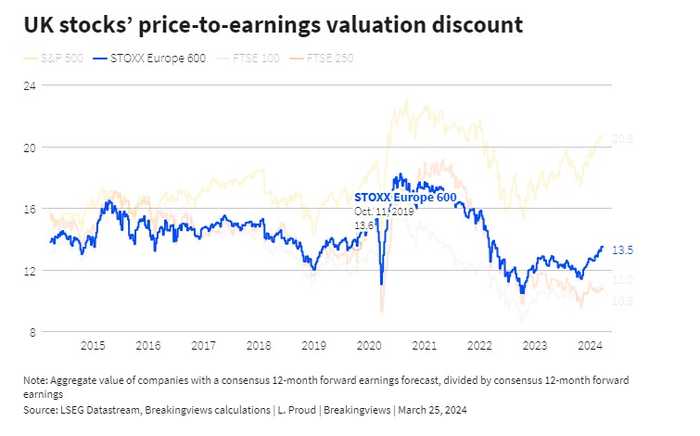Published 22:18 IST, March 25th 2024
British M&A refuseniks are playing a risky game
Direct Line Chair Danuta Gray and her Currys counterpart Ian Dyson had some justification to offer.
- Republic Business
- 3 min read

Direct hit. The boards of Direct Line and Currys have successfully repelled invaders. On Friday, Belgium’s Ageas said it wouldn’t bid again for the 2.4 billion pound British insurer. That followed decisions by U.S. hedge fund Elliott Investment Management and Chinese suitor JD.com to walk away from the hunt for the 680 million pound electrical retailer. For M&A raiders eyeing other lowly valued UK companies, the question is whether the 40% premiums that both targets refused now need to be more like 50% or even 60%.
Boards often argue that incoming M&A undervalues their charges. Direct Line Chair Danuta Gray and her Currys counterpart Ian Dyson had some justification. Ageas’ 233-pence-per-share offer was about a third below where Direct Line shares traded in early 2021, while Currys’ 67-pence-a-share offer from Elliott was half the target’s 2021 peak. More broadly, UK stocks look historically cheap: both the FTSE 100 of blue-chips and the FTSE 250 index, which includes mid-sized companies, trade at around 11 times forecast 2024 earnings, using LSEG Datastream figures. That compares with an average of around 14 times for both indexes between 1998 and 2023, Fidelity International reckons.
Gray and Dyson, the two holdout chairs, can point to potential green shoots. Currys’ earnings are bombed out because of Nordic sales issues from which it is recovering, while selling Greek assets will repair the balance sheet. Investec analysts reckon its UK subscription business alone could merit a 1 billion pound valuation. Direct Line CEO Adam Winslow on Thursday announced a series of cost cuts which, along with recent premium hikes, make UBS analysts think the group can hike earnings per share to 31 pence by 2026. At around the low end of its historic multiple range of 8 times, that implies it can get comfortably above 233 pence per share.
Equally, the suitors had good reasons to walk away. Currys’ revenue could decline this year and next, according to analyst estimates compiled by LSEG. Direct Line’s fair value is only 208 pence, Citi analysts reckon. The Bank of England reckons the UK economy will grow only 0.25% this year and 0.75% next – way off its 2% annual rise between 2010 and 2019. The disparity with the likely 2.1% U.S. growth in 2024 is a good reason for a discount.
As ever, the market is a handy judge. Currys shares have dropped from 69 pence a month ago, amid the takeover drama, to about 60 pence now. On Monday morning, following Ageas’ departure, Direct Line shares slumped 13% to 181 pence. If investors agreed with boards that the bids were lowballs, they should buy the shares and push them to levels around or above the offer prices. Instead, the risk is that both groups wind up like Britain’s Wood Group, whose stock now languishes 35% below its level last May, when U.S. investor Apollo Global Management walked away from a takeover attempt. Add it all up, and a new normal of 60% premiums for foreign forays into the UK looks likely to stay largely in domestic boards’ imaginations.

Updated 22:18 IST, March 25th 2024